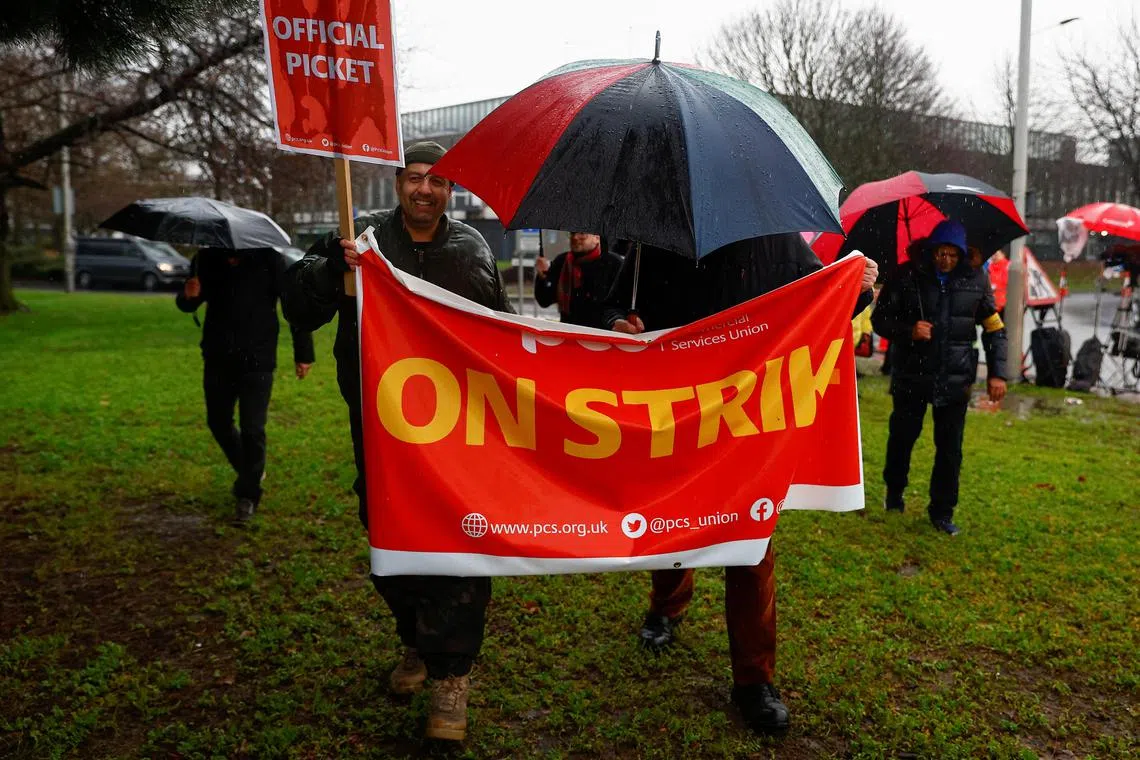UK teachers and civil servants join biggest strikes in years on ‘Walk Out Wednesday’
Sign up now: Get ST's newsletters delivered to your inbox

Members of the Public and Commercial Services Union hold a banner, as they take part in a border force workers strike action near Heathrow Airport, in London, on Dec 23, 2022.
PHOTO: REUTERS
Follow topic:
LONDON - Up to half a million British teachers, civil servants, train drivers and university lecturers walked out over pay and conditions on Wednesday in a fresh round of country-wide strikes in Britain
The mass walkouts across the country shut schools, halted most rail services, and forced the military to be put on standby to help with border checks on a day dubbed “Walk Out Wednesday” by unions.
About 300,000 teachers are expected to strike on Wednesday, the biggest group involved, as part of wider action by 500,000 people, the highest number since 2011, when civil servants walked out en masse.
Others on strike include border force workers carrying out immigration and customs checks at British air and sea ports.
The PCS Union, representing about 100,000 striking civil servants from more than 120 government departments, warned Prime Minister Rishi Sunak’s government that further co-ordinated action was inevitable.
“If the government doesn’t do something about it, I think we will see more days like today with more and more unions joining in,” PCS general secretary Mark Serwotka told Reuters. “We need money now.”
General Secretary of National Education Union Mary Bousted told Reuters that teachers in her union felt they had no choice but to strike as declining pay meant high numbers were leaving the profession, making it harder for those that remain.
“There has been over the last 12 years a really catastrophic long term decline in their pay,” she said outside a school in south London.
“None of the people behind me want to be on strike today but they are saying, very reluctantly, that enough is enough and that things have to change.”
Britain has witnessed months of strikes from tens of thousands of workers. These have included postal staff, lawyers, nurses and employees in the retail sector. British inflation has raced above 11 per cent, the highest level in more than 40 years
‘No magic wand’
Education minister Gillian Keegan stuck to the government’s position on Wednesday. It has taken a hard line with public sector workers, telling them that giving in to demands for large wage increases will only fuel inflation.
“What we cannot do is give inflation busting pay rises to one part of the workforce and make inflation worse for everybody. That’s not an economically sensible thing to do,” she told the BBC.
“I would love, nothing would give me more pleasure than, to wave a magic wand and have all of you paid lots more,” Prime Minister Sunak said on Monday on a visit to public health workers, who are planning further walkouts in the coming days and weeks.
“An important part of us getting a grip of inflation and halving it is making sure the government’s responsible with its borrowing, because if that gets out of control that makes it worse, and it’s about making pay settlements reasonable and fair,” Mr Sunak added.
So far the economy has not taken a major hit from the industrial action, with the cost of strikes in the eight months to January estimated by the Centre for Economics and Business Research at about £1.7 billion (S$2.8 billion), or about 0.1 per cent of expected GDP.
It put the estimated impact of the teachers’ strikes at about £20 million a day.
But the strikes may be having a political impact on Sunak’s government.
His Conservative Party trail the opposition Labour Party by some 25 percentage points in polls and surveys indicate the public think the government has handled the strikes badly.
Dr Jonathan Novelle, a physician, said Britain was in a difficult situation given that resources were limited.
“It’s sad, teachers... kids want to do their exams and I think there’s a huge amount of pressure on everybody. Depressing,” he said near London Bridge station.
Outside Bishop Thomas Grant School in Streatham, south London, Ms Natasha De Stefano-Honey, a teacher for the last 14 years, said it was the worst period for education she could remember.
“Maybe 10 years ago I would really recommend teaching as a career and now I am one of those teachers that can’t recommend it,” she said.
“Although I love teaching it is just so hard, it is just so tiring. There aren’t enough of us doing all of the work that needs to be done.”
Since late 2022, a number of private sector workers have managed to agree new pay deals with employers, leaving behind employees paid by the taxpayer.
“After years of brutal pay cuts, nurses, teachers and millions of other public servants have seen their living standards decimated – and are set to face more pay misery,” TUC general-secretary Paul Nowak said ahead of Wednesday’s strikes.
Nationwide rallies
Next week, nurses, ambulance staff, paramedics, emergency call handlers and other healthcare workers are set to stage more walkouts, while firefighters this week also backed a nationwide strike.
Those striking are demanding above-inflation pay rises to cover rocketing food and energy bills that they say has left them stressed, feeling undervalued and struggling to make ends meet.
Mr Sunak has introduced a draft law requiring some front-line workers to maintain a minimum level of service during walkouts.
The Prime Minister has defended the plans in Parliament as “reasonable” and in line with other European countries. REUTERS

